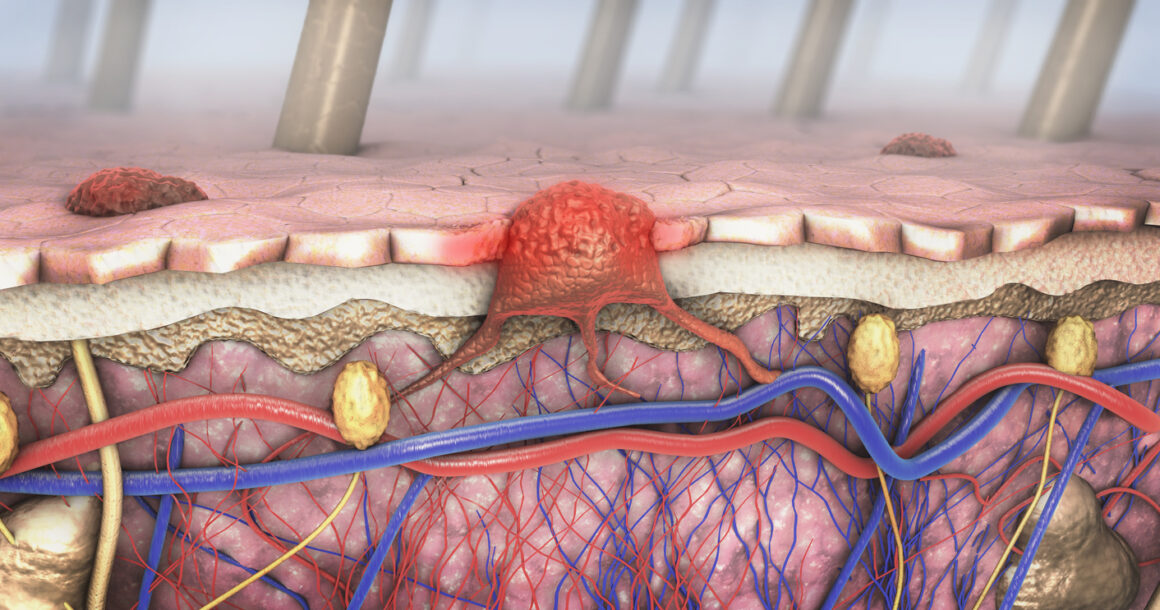Chemotherapy (ChT) has always been the standard of care for the treatment of metastatic Merkel cell carcinoma (mMCC), but response rates are often not sustained [1, 2]. Bavencio® (avelumab) is the first and only anti-PD-L1 immunotherapy approved in Switzerland for patients with mMCC and is convincing in both the first (1L) and subsequent lines (2L+) with a sustained response and significant survival benefit for patients [2-6]. Current data also confirm its effectiveness in a real clinical context [7-9].
Merkel cell carcinoma (MCC) is a rare disease, but its incidence is increasing [10, 11]. Patients with metastatic disease in particular have a poor prognosis and less than 18% survive for more than 5 years [1, 12]. Bavencio® (avelumab) is an effective immunotherapy in this setting as an alternative to ChT [3, 4]. This article gives you an overview of the most important study results on avelumab in 1L and 2L+ and also summarizes new real-world data presented at the ESMO Congress in October 2023 [1, 2, 5-9].
Sustained response and survival benefit with avelumab
The 1L efficacy of avelumab was tested in a cohort of the phase 2 JAVELIN Merkel 200 study, which included 116 patients with previously untreated mMCC [6]. After a median follow-up of 54.3 months (range: 48.0 – 69.7), the median overall survival (mOS) was 20.3 months (95% CI: 12.4 – 42.0), with a 4-year OS rate of 38.0% (95% CI: 29.0 – 47.0) [6]. The efficacy of avelumab in 2L+ was tested in 88 patients whose disease had progressed after one or more previous lines of ChT [1, 5]. After a median follow-up of 65.1 months (range: 60.8 – 74.1), the mOS was 12.6 months (95% CI: 7.5 – 17.1) with a 5-year OS rate of 26% (95% CI: 17 – 36) [5]. In addition, avelumab showed a low rate of higher grade treatment-related adverse events (TRAEs) and there were no treatment-related deaths in either 1L or 2L+ [2, 5].
Real-world data confirm efficacy in 1L and 2L+
In a prospective German registry study, 100 patients with non-resectable stage III or IV mMCC in 1L were treated with avelumab [7]. After a follow-up of 28.8 months (95% CI: 20.5 – 32.5), the mOS was not reached in either group. The mPFS was 15.6 months (95% CI: 5.6 – NE) and 7.3 months (95% CI: 3.0 – 13.7) for stage III and stage IV mMCC, respectively [7]. In another registry study from England, the mOS of patients with stage III or IV mMCC treated with avelumab or another 1L treatment was compared [8]. With an mOS of 37.8 (95% CI: 12.9 – NE) vs. 13.0 (95% CI: 8.3 – 19.6) months for stage III and 19.9 (95% CI: 5.0 – NE) vs. 7.2 (95% CI: 5.9 – 9.1) months for stage IV, treatment with avelumab proved to be superior compared to other 1L therapies (Fig. 1) [8]. Most recently, a retrospective study from France included 180 patients with mMCC who were treated with avelumab in 2L+. After a median follow-up of 13.1 months, an mOS of 14.6 months (95% CI: 9.9 – 21.3) was recorded from the start of treatment [9].
Conclusion
Overall, both 1L and 2L+ treatment with avelumab offer significant survival benefits for mMCC patients [5, 6]. At the same time, low rates of higher-grade TRAE were observed [2, 5]. Real-world data from several cohorts confirm the survival benefit of avelumab in 1L and 2L+ and thus confirm the clinical results from the JAVELIN Merkel 200 study [2, 5, 7-9].

Figure 1) Overall survival (OS) of patients with stage III or IV mMCC from the start of 1L therapy with avelumab (dark blue) or other 1L therapies (95.5% of which ChT, turquoise).
Adapted from Knott et al. 2023 [8].
Abbreviations
ESMO = European Society for Medical Oncology; CI = confidence interval; PD-L1 = programmed death-ligand 1
The BAVENCIO® brief technical information.
CH-AVE-00074 01/2024
With the financial support of Merck (Schweiz) AG.
Literature
1 D’Angelo, S.P., et al, Avelumab in patients with previously treated metastatic Merkel cell carcinoma: long-term data and biomarker analyses from the single-arm phase 2 JAVELIN Merkel 200 trial. J Immunother Cancer, 2020. 8(1).
2 D’Angelo, S.P., et al, First-line avelumab in a cohort of 116 patients with metastatic Merkel cell carcinoma (JAVELIN Merkel 200): primary and biomarker analyses of a phase II study. J Immunother Cancer, 2021. 9(7).
3. information for healthcare professionals BAVENCIO® (avelumab) .
www.swissmedicinfo.ch
, current status.
4 Becker, J.C., et al, S2k guideline – Merkel cell carcinoma – Update 2022, J Dtsch Dermatol Ges, 2023. 21(3): p. 305-317.
5 D’Angelo, S.P., et al, Avelumab in patients with previously treated metastatic Merkel cell carcinoma (JAVELIN Merkel 200): updated overall survival data after > 5 years of follow-up. ESMO Open, 2021. 6(6): p. 100290.
6 D’Angelo, S.P., et al, 604 First-line avelumab treatment in patients with metastatic Merkel cell carcinoma: 4-year follow-up from the JAVELIN Merkel 200 trial. Journal for ImmunoTherapy of Cancer, 2022. 10(Suppl 2): p. A633-A633.
7 Becker JC, et al. Clinical characteristics and survival of patients with advanced Merkel cell carcinoma (MCC) treated with avelumab: Analysis of a prospective German MCC registry (MCC TRIM). Presentation #1145P. Presented at ESMO Congress October 20-24, 2023.
8 Knott C, et al. First-line treatment (tx) patterns and overall survival (OS) of patients (pts) with advanced Merkel cell carcinoma (aMCC) in England from 2013-2022: Results of a nationwide observational cohort study. Presentation #1147P. Presented at ESMO Congress October 20-24, 2023.
9 Blom A, et al. Avelumab as second-line or later (2L+) treatment (tx) in patients (pts) with metastatic Merkel cell carcinoma (mMCC): Real-world tx patterns in France. Presentation #1148P. Presented at ESMO Congress October 20-24, 2023.
10 Paulson, K.G., et al, Merkel cell carcinoma: Current US incidence and projected increases based on changing demographics. J Am Acad Dermatol, 2018. 78(3): p. 457-463.e2.
11 Villani, A., et al, Merkel Cell Carcinoma: Therapeutic Update and Emerging Therapies. Dermatol Ther (Heidelberg), 2019. 9(2): p. 209-222.
12 Lemos, B.D., et al, Pathologic nodal evaluation improves prognostic accuracy in Merkel cell carcinoma: analysis of 5823 cases as the basis of the first consensus staging system. J Am Acad Dermatol, 2010. 63(5): p. 751-61.
The references are available on request.











